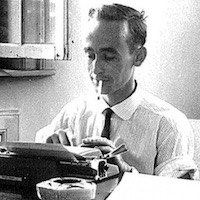News
Obituary: Adam Kellett-Long
Monday 19 December 2022

Adam Kellett-Long (photo) won the scoop of his life at a young age: he was the journalist who broke news of the Berlin Wall going up more than 60 years ago.
It was 13 August 1961 and the 26-year-old Kellett-Long - who died in hospital on Sunday aged 87 after a short illness - was the sole resident representative of the Western press in communist East Berlin.
At 1:00 am he received a tip-off from an anonymous telephone caller that led to a global Reuters beat, making him the first reporter to tell the world that East Germany had begun to divide the city. The Cold War between the Western Bloc (the US, its NATO allies and other countries such as Japan) and the Eastern Bloc (the Soviet Union and its mostly eastern-European fellow signatories to the Warsaw Pact) intensified.
Kellett-Long drove towards the Brandenburg Gate, main crossing point to West Berlin. Just as he reached it a Vopo, a policeman, waving a red torch stopped his car and told him he could go no further. “The border is closed,” he said.
As he drove back to his flat/office to file the momentous story to Reuters London headquarters by telex, his car was halted for 10 minutes by a seemingly endless convoy of lorries ferrying heavily-armed militia and police to the East-West dividing line.
While the State Radio began broadcasting a series of ominous decrees to the still sleeping population, all road crossing points as well as the city’s underground and overhead railways also closed. Work began with concrete posts and barbed wire all along the border. It was the start of the wall which, until the crude cement blocks that formed it could be swung into place, snaked through Berlin as a barbed wire fence.
Reuters was eight minutes ahead of everyone in reporting the event, scoring not only through being first but because for a long time no other Western journalist was in East Berlin to rival Kellett-Long’s graphic eye-witness story. Border police and troops for a while let no-one pass.
“The Brandenburg Gate, main crossing point between the two halves of the city, was surrounded by East German police, some armed with sub-machine guns, and members of the para-military 'factory fighting groups’,” Kellett-Long reported.
“I drove back through the gate and watched four West Berlin cars pass through after a policeman saluted and checked their identity cards. All asked questions, and he explained the new regulations patiently. It appeared that the police were under strict instructions to try to avoid incidents.
“At one of the other 13 checkpoints cars and pedestrians were being allowed through. Three cordons of police checked my passport as I walked through. The first cordon was armed with rifles or sub-machine guns, the second with revolvers and batons. The third group were unarmed. The security precautions nevertheless were on a large scale. All along the border about 100 yards back, armed police and factory workers were guarding buildings in pairs. I sighted one armed policeman gazing out from a top-floor window.”
By daylight it was known that Westerners would be allowed to cross, but the border was closed to East Germans and West Berliners unless they had a special pass. Kellett-Long, using his green press accreditation card, was the first person to drive through the Brandenburg Gate in a car with East Berlin number plates after the clamp-down.
Kellett-Long joined Reuters in 1958. After East Berlin, postings were Peking (1962-64), Johannesburg (1965-1967), Moscow (1967-1970), and Bonn (1970-73). He spent the rest of his Reuters career in London except for an 18-month spell in Geneva (1980-81) overseeing the final construction stages and opening of the agency's European Technical Centre.
All that time, the Wall remained in place for 28 years until 9 November 1989, when Reuters scored another world beat: first with news of the wall coming down, leading to re-unification of East and West Germany. Most evidence of the wall's existence has now vanished.
- « Previous
- Next »
- 109 of 2176